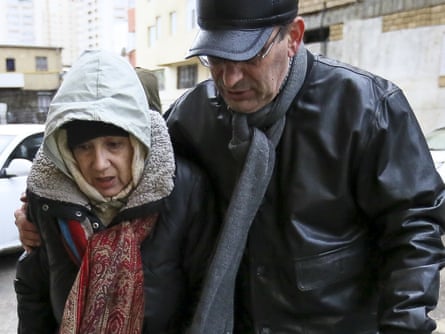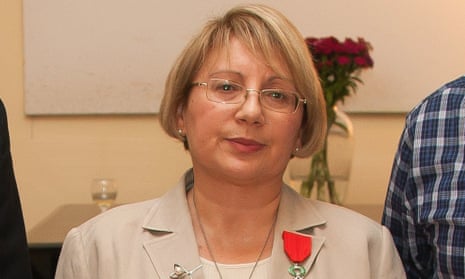Prominent Azerbaijani human rights activist Leyla Yunus has been released from prison on humanitarian grounds, but is still facing treason charges alongside her husband, Arif. .
An appeals court in Baku converted Yunus’s eight-and-a-half year jail sentence into a suspended term because of her deteriorating health, and placed her on probation for the next five years. Her conviction on charges including tax evasion and fraud, widely denounced as politically motivated, remains in place.
Yunus, 59, suffers from a number of ailments including diabetes and hepatitis C.
“I said in court that I was turned into prison dust,” she told reporters after her release on Wednesday. Quoting from 19th-century poet Fyodor Tyutchev, she added, “It’s not given us to foretell how our words will echo through the ages, but [forgiveness] is given us as grace is given us.”
She has complained that she was severely beaten by prison guards since being detained in July 2014.

Yunus appeared frail as she left the courtroom, walking with difficulty and leaning on her husband. Arif Yunus had been sentenced to seven years in prison on similar charges but was released in November, also on health grounds.
Shortly after her release Yunus paid a visit to her grandfather’s grave, where her husband had proposed to her.
The appeal court also overturned a decision to confiscate one of the Yunus’s two apartments registered under the name of their daughter, Dinara.
Yunus’s lawyer, Elchin Sadigov, said the second apartment remains in the state’s possession. Sadigov said he was “not fully satisfied” with the decision. “We had asked for all the charges to be dismissed,” he said.
The prosecution of Leyla and Arif Yunus has been condemned by the international community as part of a deepening crackdown on dissent in Azerbaijan.
Numerous other activists, journalists, and government critics, including investigative journalistKhadija Ismayilova, remain imprisoned in Azerbaijan on charges that western officials and international rights groups have called politically motivated.
Baku has repeatedly rejected the accusations, insisting that the cases in question are strictly criminal in nature.
The Yunuses, who had worked for the unregistered Peace and Democracy Institute in Baku, face treason charges in a separate case stemming from allegations of spying for Armenia.
Amnesty International has described the couple as “prisoners of conscience, imprisoned solely for their legitimate human rights work and criticism of the government”.
Their release follows recent efforts by their daughter, Dinara, to increase Western pressure on the government.
Dinara Yunus met US officials and prominent rights advocates during a trip to Washington in October, where she said she feared her parents would “die behind bars” due to their failing health.
US State Department spokesman John Kirby welcomed Yunus’s release, adding in a statement that Washington “will continue to seek opportunities to advance all areas of our relationship, including security, energy, and democracy and human rights, in partnership with the Azerbaijani government and people”.
European officials also welcomed the decision to release Leyla Yunus. A spokeswoman for EU foreign-policy chief Federica Mogherini said it was “a welcome and positive humanitarian gesture”.
“The European Union, at the same time, hopes that further steps will follow, and we are ready to further deepen and broaden our relationship with Azerbaijan,” said the spokeswoman, Maja Kocijancic.
European Parliament President Martin Schulz called Yunus’s release “wonderful news for all the defenders of human rights in Azerbaijan and worldwide” but pointed out that Yunus and her husband had been released “only conditionally”.
“The European Parliament reiterates its request for the charges against them to be dropped and their names fully cleared,” Schulz said in a statement, adding that Azerbaijani authorities should “continue on this path and show good will by releasing the remaining prisoners of conscience”.

Comments (…)
Sign in or create your Guardian account to join the discussion